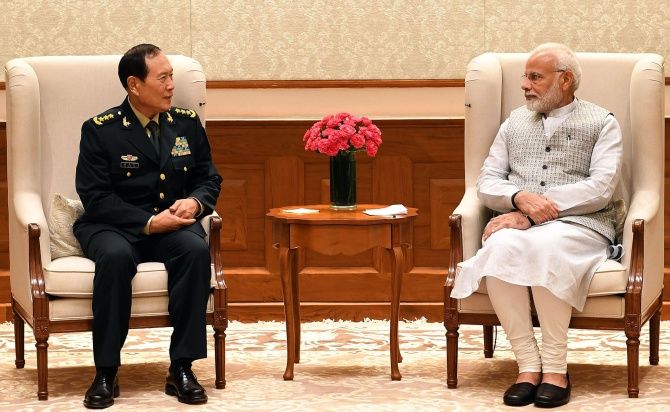'China's military is expected to deploy full throttle its new equipment including J-20 stealth fighters, drones, medium range missile systems, surveillance and others to continue to put psychological pressure on India,' warns Srikanth Kondapalli, Professor in Chinese Studies, JNU.

China's Defence Minister General Wei Fenghe is on a visit to India from August 21 to 24. He met with Prime Minister Narendra Damodardas Modi, Defence Minister Nirmala Sitaraman and others to implement the decisions arrived at by PM Modi and President Xi Jinping at Wuhan four months ago.
Although technically the defence minister's position in Chinese power structure is relatively low, compared to counterparts abroad, General Wei is a confidante of Xi.
Besides, he held the most sensitive assignment of commander of the missile forces till recently.
General Wei is a successor to the deposed Fang Fenghui who is being 'investigated' for corruption since last year before the Doklam crisis.
Although he has been in office for just six months, as a Xi confidante, General Wei is going places. Xi appointed Feneral Wei as commander-in-chief of the crucial rocket forces of the country between 2012 and 2018.
Wei's closeness to Xi is seen in the fact that he was made a full general in the military just eight days after Xi became chairman of the all-powerful Central Military Commission in October 2012.
Being a relatively younger officer (he was born in 1954), General Wei is likely to last many terms in the military hierarchy in the coming years.
The general recently visited Russia, Belarus, Vietnam, Cambodia and Myanmar, addressed the 15th meeting of defence ministers of the Shanghai Cooperation Organisation (in which Defence Minister Sitaraman participated), and met with his counterparts in Beijing, including with US Defence Secretary James Mattis.
It was announced that the main missions of General Wei, who led a 27-member military delegation to New Delhi, are to arrive at effective confidence building measures -- a decision taken at the sidelines of the BRICS meeting at Xiamen in September 2017 and at the Wuhan meeting in April this year; re-commencing Hand-in-Hand joint operations that were stalled due to the Doklam standoff; two additional border personnel meeting points (to the current five places); and enhancing exchanges including in the cultural and sports arena.
A press release on August 23, after meeting with General Wei, the Indian defence ministry simply stated that it was 'decided to expand the engagement' relating to training, joint exercises, and other professional interactions in addition to suggesting plans to have a new MoU compared to the May 2006 arrangement between the two defence establishments.
The statement also mentioned the 'early operationalisation' of a hotline, but did not specify at what level of the military hierarchy, indicating the continuing differences between the two -- with Beijing reluctant to arrive at a parity with New Delhi.
While the primary focus of General Wei's visit is to make efforts at stabilising borders in the wake of the 73-day border stand-off at Doklam last year, he is also tasked to gauge the Indian views on a number of issues.
Firstly, in the light of escalation of tensions between the United States and China on trade deficits and tariff hike, and more importantly to last year's formation of a Quadrilateral Security Dialogue between the US-Japan-India-Australia, and the Indo-Pacific initiative, China has been making efforts to woo India of late.
Beijing intends to push through a maritime arrangement with New Delhi in the Indian Ocean Region, without conceding any Indian role in the South China Sea.
China is stabilising its southwestern borders with India in order to gain momentum in the South China Sea militarisation drive.
A stalemate is emerging in the region after the Trump administration actively implemented freedom of navigation and overflight within the 12 nautical miles of the Chinese occupied artificial reefs.
While China implemented a 'quadrilateral fortress' strategy in the region with missile batteries and naval deployments and initiated a code of conduct with concerned South East Asian nations, the US actions are stalling full Chinese dominance of the region.
Secondly, after India and Pakistan joined the Shanghai Cooperation Organisation and its peace mission counter-terrorism exercises, Beijing intends to mediate between India and Pakistan on the terrorism issue, without compromising with its 'all-weather' friendship with Islamabad nor putting pressure on the latter for cross border terror incidents.
Thereby, Beijing also intends to seek, on a medium to long term, India's consent for the controversial China-Pakistan Economic Corridor.
Thirdly, the mandate provided by the Chinese civilian leadership is to 'manage' borders in the light of the intransigence in resolving the territorial dispute.
Following these injunctions, the military leadership has been making various efforts -- ranging from experimenting with enhancing their claimed area on the borders, active dual-use construction efforts with the intention to change the status quo, implementation of a step-by-step conflict-preventive confidence building measures, or even border stand-offs.
Despite the decision to 'fully implement' ongoing confidence building measures, the above measures by the Chinese army, in addition to the frequent border transgressions, will test the bilateral relations between the two countries in coming months.
China's military is expected to deploy full throttle its new equipment including J-20 stealth fighters, drones, medium range missile systems, surveillance and others to continue to put psychological pressure on India.










